Lecture by Jimmy Wales, founder of Wikipedia, in Yandex
On September 14, the Moscow office of Yandex was visited by someone who used to look at you from the pages of Wikipedia, he is its founder - Jimmy Wales. Famous Jimbo gave a lecture "Free knowledge as the basis of modern society." We publish a full text translation of the lecture and dialogue with the audience.
In Moscow, wonderful. I came to talk personally and online with Russian members of the Wikimedia community, as well as with everyone else - the general public, the technology community. Also, there are, of course, quite a few people from Yandex. Yandex has always been a very good friend of Wikipedia. We appreciate it. We are also here to acquaint you with the leaders of the local community and our representation. They are ready to discuss cooperation, development directions, ideas, ways of working together. I want to thank Vladimir [Medeyko] for helping to organize this event. Great to be here.
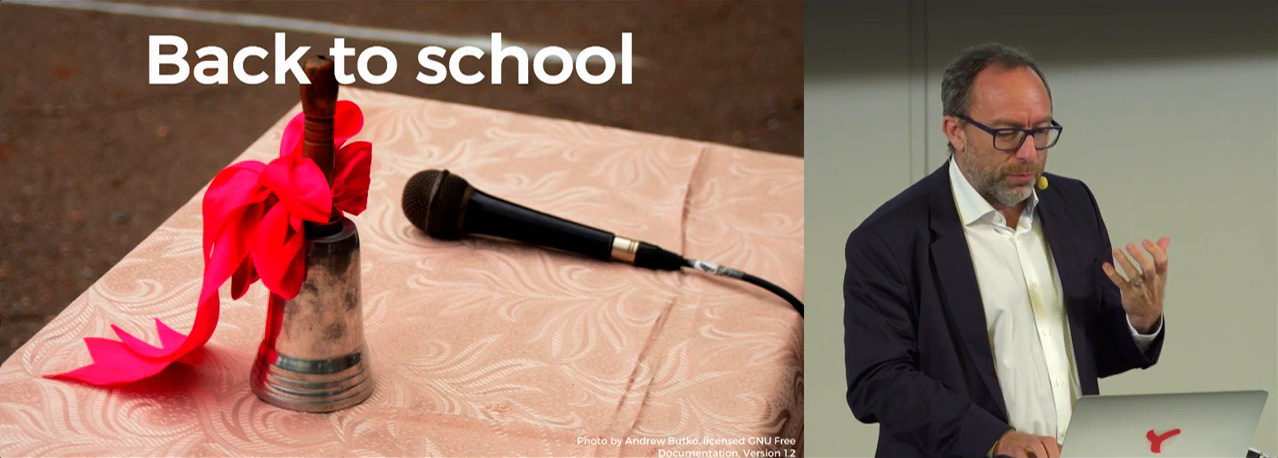
Now in Russia, September is the month of returning to school. Personally, I love this time of year very much - I have a 5-year-old daughter, which is just the time to start studying at school. In addition, an exciting holiday atmosphere is hovering in the air, like at Christmas, and even now the last warm days before winter comes.
')
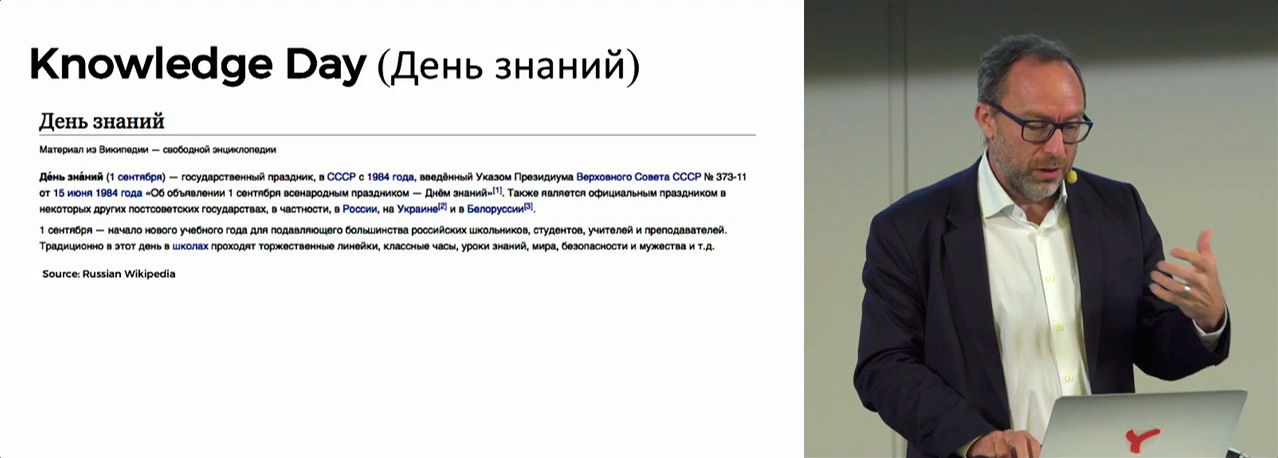
So, personally, I would like to talk today about education, technology and education. I, among other things, find it very interesting that on September 1 here is the Day of Knowledge. I think this is a great, amazing idea. I would like to see such a holiday in other places. Of course, the day of returning to school is a great event anywhere, but turning it into a holiday is a great way to highlight the very idea of gaining knowledge, learning, seeking to delve into something.
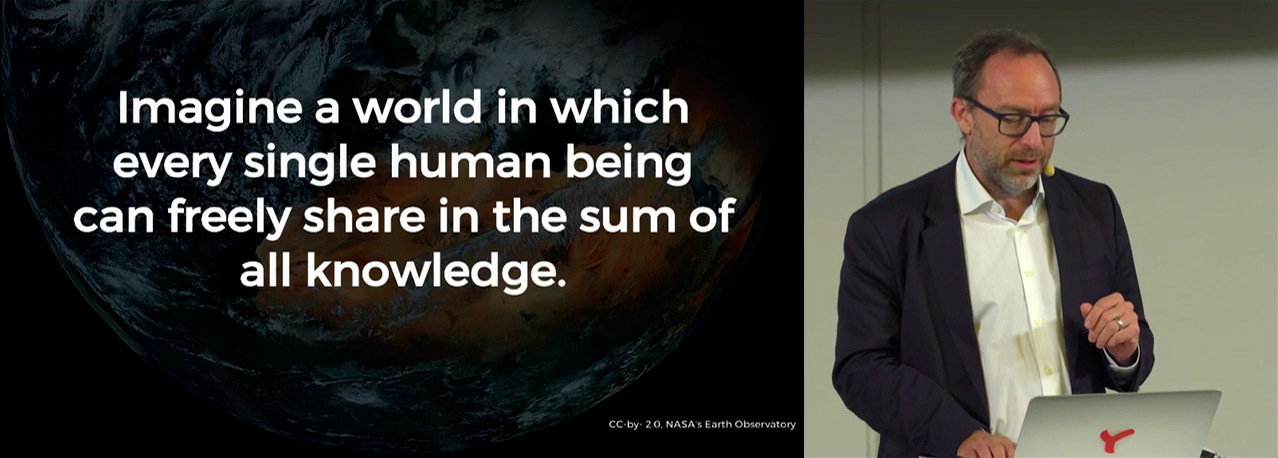
The idea of learning, of course, is fundamental to Wikipedia and everything we do. My initial presentation of the concept of Wikipedia is: "Imagine a world where every person on the planet has free access to all human knowledge." And on the slide is the larger-scale mission of the Wikimedia Foundation. It is a bit different, since it is intended to emphasize that it is not only an encyclopedia and access to knowledge, but also the participation of people, in the “free exchange of all human knowledge”. This is really the main point. We share the vision of the future and believe that knowledge is the basis, that for stability, peace and freedom in society, people should be as informed and as objective as possible. We are, of course, aware that the world is full of complex conflicts. But through the Wikipedia community, we see that ordinary people are maximally open to receiving knowledge from other people and spreading their knowledge.
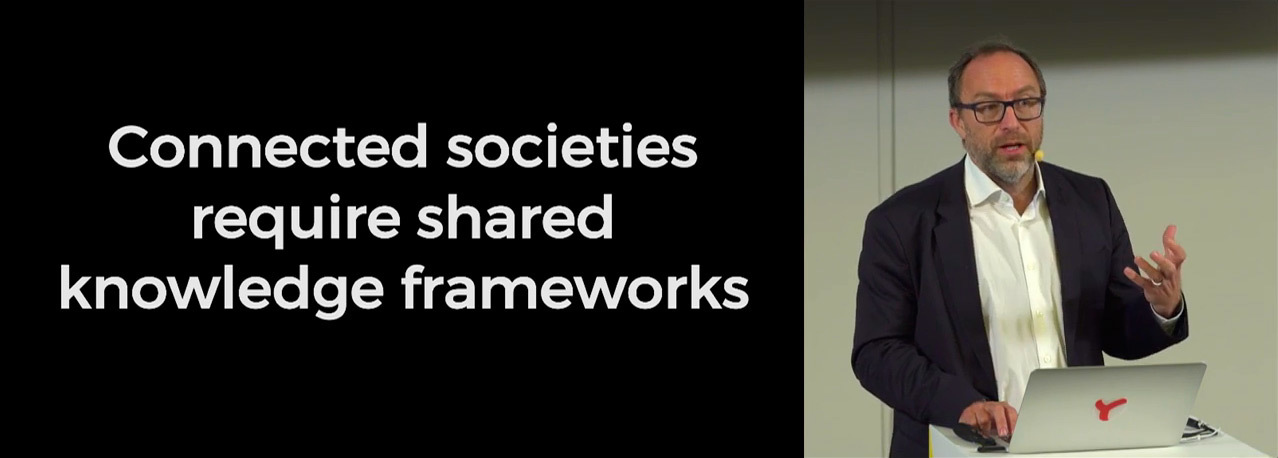
In the media, the situation is slightly different than ours. Most of the media have an agenda, take someone's side, etc. We, in turn, want to step back a bit and say: no, let's be as calm as possible. Everyone knows the style of Wikipedia. We give you the facts, explain the point of view of both parties, do not force you to believe in one or the other. The key part has always been just that, but to achieve this, the Internet communities need a framework for sharing knowledge. Wikipedia works including the fact that there are connections between different communities and that we all use the same platform and free licenses - this is an important point, I will tell you more about it. Free licenses allow you to distribute and transfer knowledge.
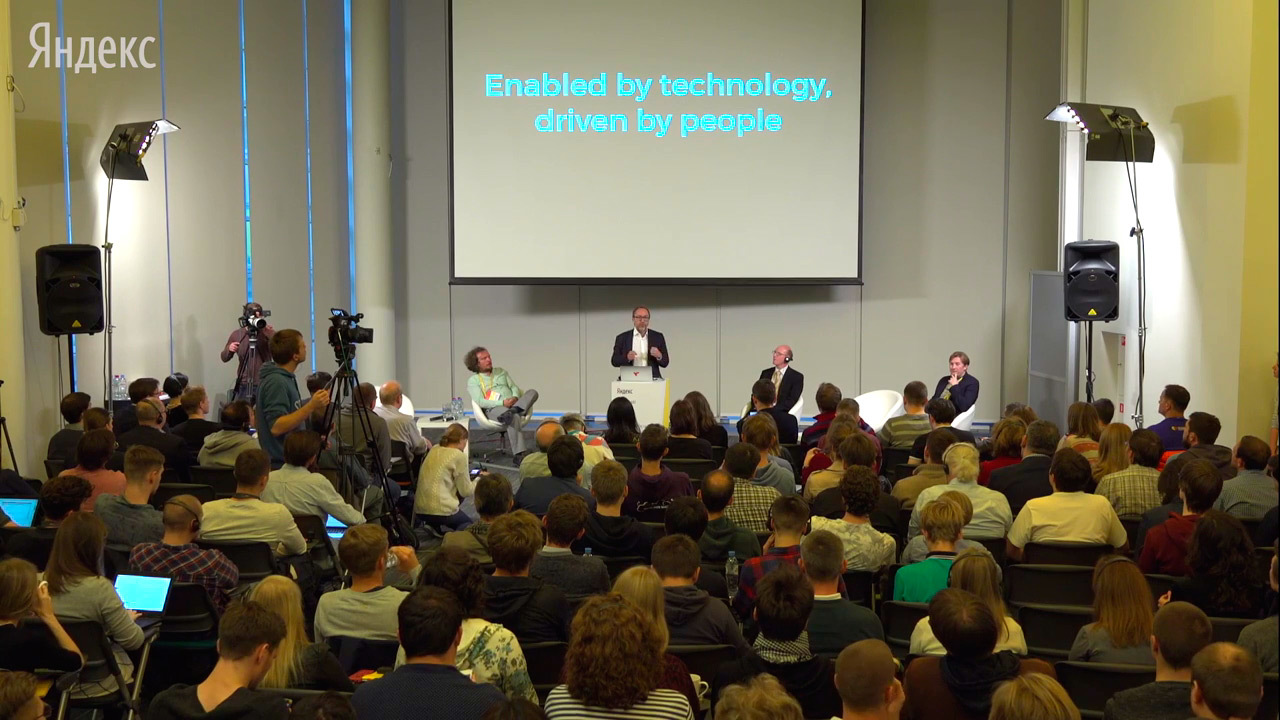
I find it sad that Wikipedia is considered a history of technology and is placed in the same category with Google, Yahoo !, Yandex, Baidu and other companies around the world. Yes, we, of course, use the technologies of the web and our open platform, and they allow the community to unite. But in reality, the heart and soul of Wikipedia is the community itself. Fundamentally, we are not a technological organization. Although we have a team of excellent engineers and other specialists, technologically we are extremely small. But as a community of volunteers, we are so global and international that if you want to understand Wikipedia, you need to think of us rather as a cultural group, cultural institution, and not as a technology company - because we are not.
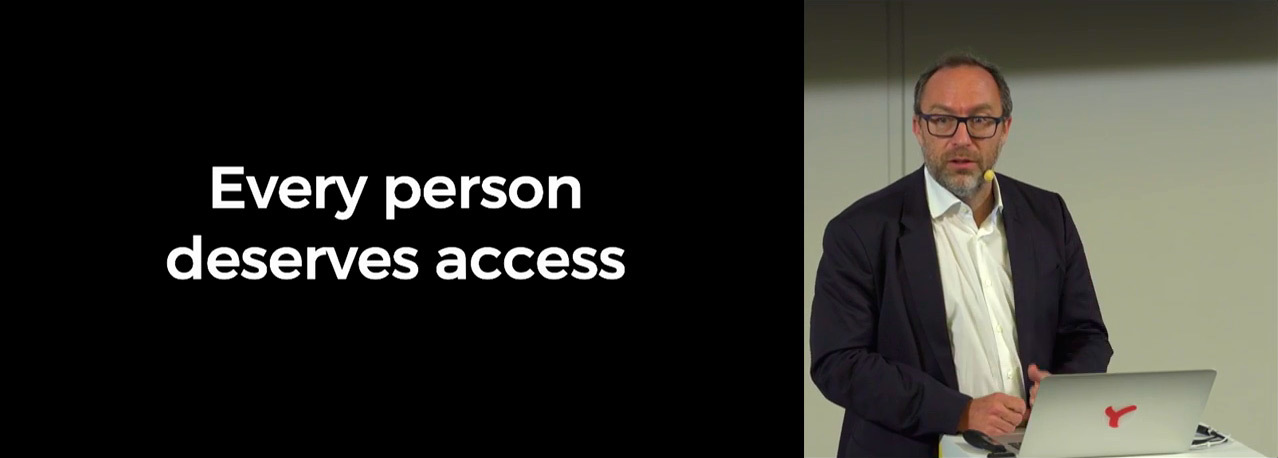
Some of our principles are about accessibility. If you go back to the presentation of the concept, then there we are talking about every person in the world. Wikipedia in our understanding is global by nature. We want everyone to have access to knowledge. And this - this is a rather interesting fact - means that we are also very local. It would be absolutely unrealistic to manage the work of the Russian Wikipedia from San Francisco. Each local version of Wikipedia is written by people in their language. Therefore, the idea that Wikipedia for some reason is an American project does not bear any truth. Wikipedia is very local and very global.
We warmly welcome accessibility, especially for people in developing countries. Since we are doing charity work, we are really looking forward to when the next billion people get online, and we want to understand how these people will get access to Wikipedia. One of the stories that I am always happy to discuss is the Wikipedia Zero project. As part of it, we work with mobile operators to provide people in developing countries with access to Wikipedia without billing traffic. It is very important. We know that not everyone has access. In theory, people with access should become more and more, since the price of a simple Android phone is significantly reduced each year, but network charges are still quite high. Wikipedia Zero - just about that. When we opened the project and announced it in several countries, an amazing thing happened by itself: a group of teenagers from South Africa launched an online petition asking local operators to make access to Wikipedia free. I'll show the video, but I need help. As I said, we are not a technology company, so I am not very good at handling computers.
Children :
- Hello. We wrote this letter together with my classmates to get free access to Wikipedia. Here is how it sounds.
Open letter to Cell C, MTN, Vodacom and 8ta. We are students of the 12th grade at Cinenjong High School, Joe Word Park, Milnerton, Cape Town. We recently heard that in some other African countries, such as Kenya and Uganda, cellular service providers provide customers with free access to Wikipedia. We think this is an excellent idea, and we want to encourage you to do the same here in South Africa. There is no library in our school. 90% of us have mobile phones, but we cannot afford the Internet. Free access to Wikipedia would play an important role for us. Wikipedia is one of the best sites that can help us in learning. There is information on almost any topic. Think of the impulse that we, the students, and the entire educational system of South Africa can get. Our education system needs help, and access to Wikipedia will play a very positive role. (Children repeat “Thank you.”)
Jimmy :
- I am pleased to announce that just three months after the video was published, one of the operators - it seems MTN - fulfilled the request and recorded a very nice video in response.
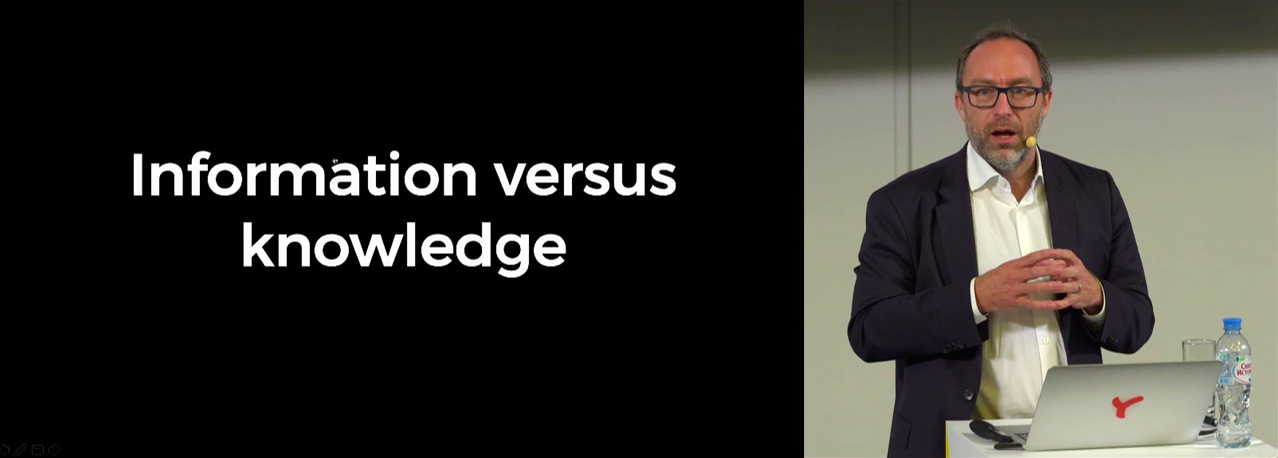
This is just one of the projects we work around the world with the goal of providing access to knowledge. I think it is important to think about the difference between information and knowledge. We obviously live in a world full of information. It is also not parsed, not sorted, it is very much, and so on. But we are trying to condense this information on Wikipedia in order to distribute it and make it available in a more intelligent form. We are talking about a lot of academic work. It would be difficult for people to access the data and understand them without someone who would take and write them in neutral language, lowering the entry threshold for everyone else. This is really quite important. Since we have become part of the global infrastructure, we feel very serious and big responsibility for ensuring that Wikipedia is as good as possible. We want Wikipedia to become a key element in obtaining knowledge by all people, which means that it should be as reliable as possible, etc. Since our writers are only volunteers, it is important for us that our community has certain principles.

Here are a few facts - many in this room are already familiar with them. We started in 2001, we now have 41 million articles, every month 80,000 volunteers edit Wikipedia. In addition, we are a charitable, non-profit organization.
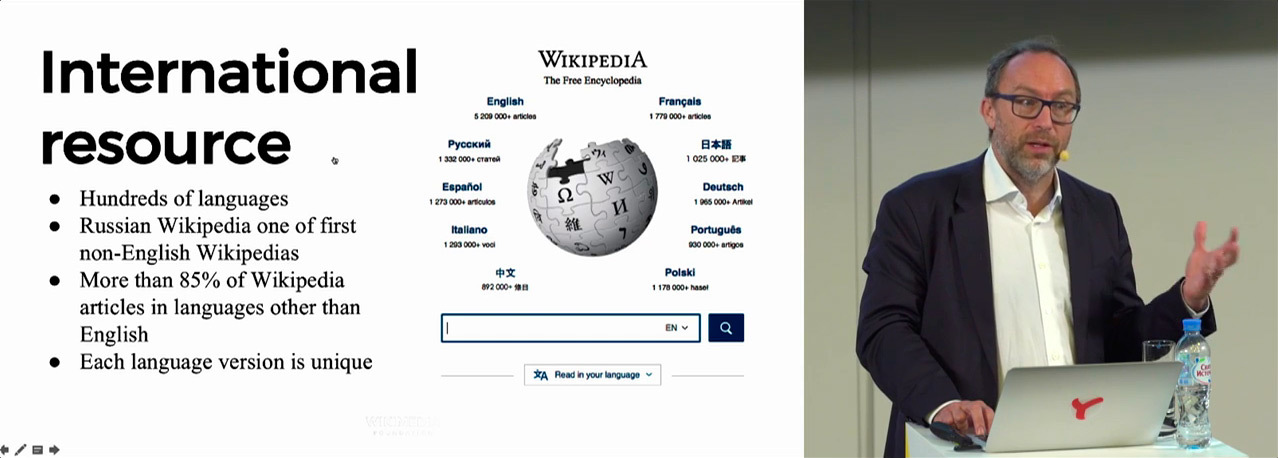
In a minute I will talk about Russian Wikipedia, but first I’ll quickly say that we have hundreds of languages, that Russian Wikipedia was one of the first to be written not in English, and that 85% of our articles are not English. So when people think that Wikipedia is basically an English-language project ... I remember many years ago I was in Germany and participated in a panel discussion with one professor, talking about the global nature of Wikipedia. He then put it very expressively: “Yes, but it’s unfair when Wikipedia is written in English and then simply translated into German.” And I answered: “Actually, it is not translated - it is written by the Germans immediately in German,” and in the same way it is written by Russians in Russia. This is very important for many reasons.
Think about the context of knowledge. You need to understand the reader. If I want to read about, I don’t know, Bollywood films and I will read about them in Hindi ... In Hindi, you can accidentally mention something and understand it all, because they have the same cultural heritage. But in English, you may need to clarify something, indicate who you are talking about. This difference is just a few words, but you still need to adjust, otherwise the result will be different depending on the language of the reader. Therefore, it has always been important for us that the version in each language is unique and meets the needs of the local community.
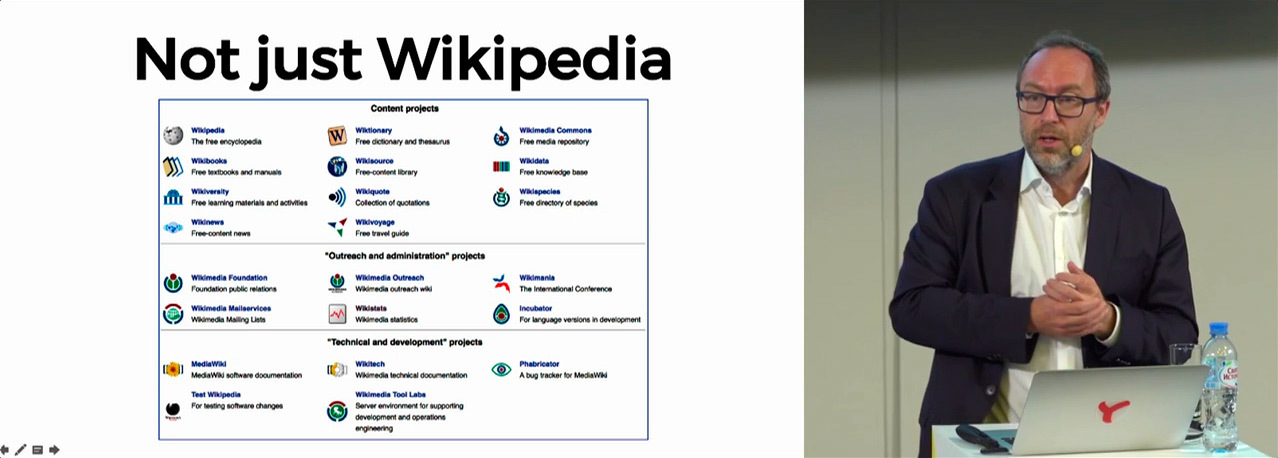
In our global nature, we are not just Wikipedia. We have a whole set of content projects. Dictionary, Wikisource, Wikimedia Commons, Wikibooks, etc. Knowledge has many aspects. Wikipedia is, of course, the most famous and successful, but other projects play their own role, independent of Wikipedia, although they also serve as a support structure for it. So if you look a little deeper, it turns out that we have a lot of things happening in all these projects.
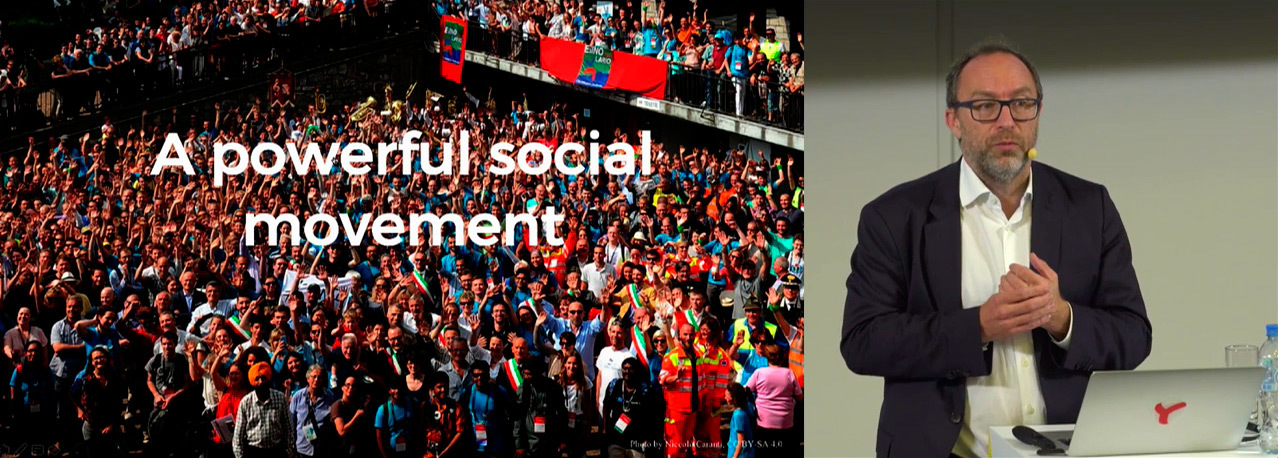
In addition, Wikipedia is also a powerful social movement. I love this photo - it was taken in the summer of 2016 in Italy, at our Wikimania conference, which we hold annually in different cities of the world. The competition for choosing a city is like a lottery before the Olympics, and I hope that someday we will be able to come to Moscow - it would be wonderful to hold a conference here. Every year we invite volunteers from all over the world - they come and share their valuable experiences. Some say - in our language we are confronted with such and such a problem, others respond - yes, we also have it, that's how we fight it and, imagine, we tried such-and-such methods, some helped worse others are better ... So volunteers get together to learn from each other, learn to cooperate, learn to use resources that are already used by others, etc.
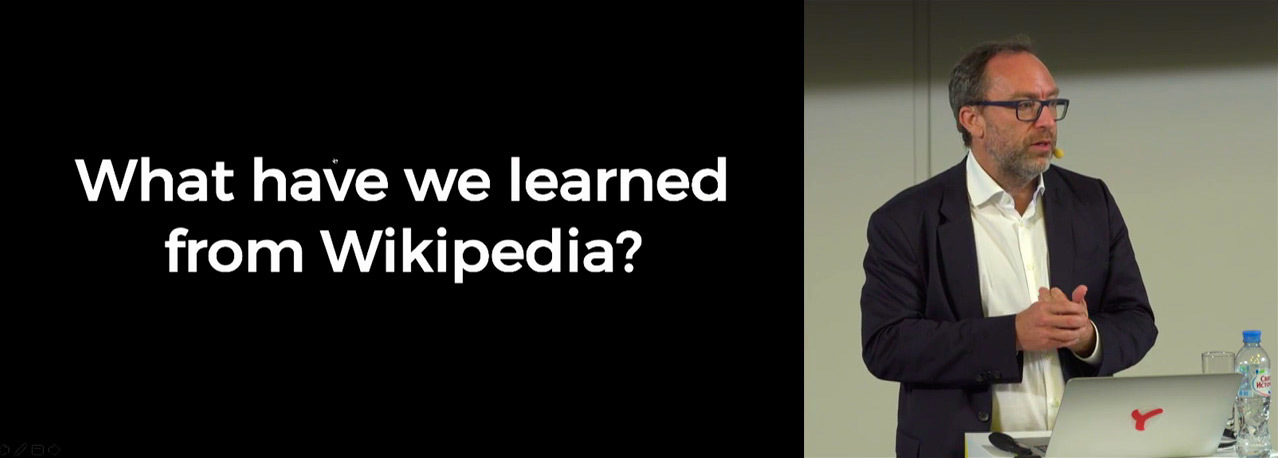
So what lessons have we learned? What did we learn from Wikipedia? A lot of everything. For example, that knowledge is born together.
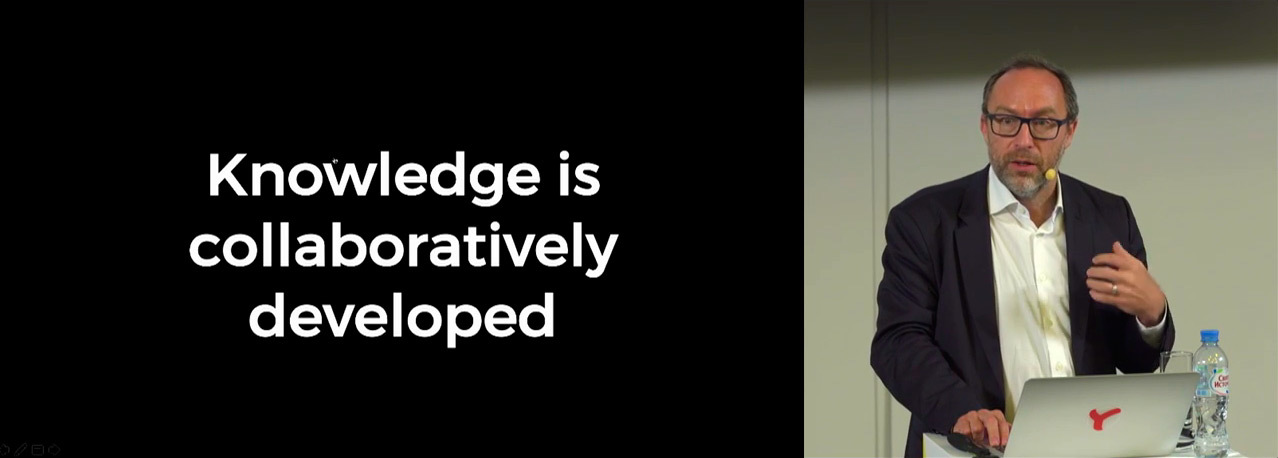
It is very important that knowledge is local in nature, concrete, comes from many people and from many cultures. That when we work together we can achieve higher quality. That the model of working together on Wikipedia, as economists have proven, leads to results comparable to traditional encyclopedias, but on a much larger scale. When people are interested in Wikipedia model or doubt it, I always answer: once we look back, look at the traditional model and say - wait, this whole book was written by one person and tested by two more? I got used to content checked by hundreds of people who had been discussing every word for a long time - because they wanted to achieve maximum quality. Yes, such an open editing system obviously creates a lot of noise. Sometimes there are mistakes, etc. But it was always important for us to emphasize that we need to work together. This is a global project that allows us all to unite and exchange knowledge among themselves.
We also understood that knowledge grows, being free. In the word "free" I put the same meaning as in open source, that is, we are talking about free licenses. Everything on Wikipedia must be licensed in as free form as possible - so that you can copy, edit and distribute any piece, including in an already modified form. And your goal can be both non-commercial and commercial. Having the ability to use Wikipedia to create various tools that help spread knowledge further than if we were tightly controlled, is a great blessing for commercial organizations. We want Wikipedia to be used again and again, this is very important.
What we should think about in the context of the entire Internet is its original spirit. His spirit was open exchange and collaboration. Now in many parts of the world there are many questions about this - they relate to the possible fragmentation and regulation of the Internet. As a result, these questions will affect him pretty much. Most people are not interested in them, but I think we should be all the same.
As I said, free licenses play a big role here. And one of the processes in which we have succeeded very much is working with galleries, libraries, archives and museums. We encourage them to use free licenses.
Here is another example of how local work brings global benefits, how local knowledge — for example, created by the local cultural community — begins to spread throughout the world through interaction with us and the introduction of a free license. I know that there is such a project in Russia, and I’ll tell you about it a little later. But for now let's talk about Bergen - a city in Norway. According to the old local tradition there is an annual festival where young drummers compete. Colorful banners are hung everywhere ... The Norwegians talked about this festival in their place - in the Norwegian, very local version of Wikipedia. But besides that, they translated the article into English, and already someone translated it from English into French, German, etc. As a result, the whole world will learn about the festival. In other words, Wikipedia gives people working locally the opportunity to tell their world about their traditions, ideas and culture. And free licenses are a key element of this extraordinarily powerful process.
Since, as already mentioned, we are closely monitoring the quality, a very important condition for us is the availability of reliable sources. We need them, whether they are good newspapers, magazines or academic publications. Wikipedia in many ways becomes their reflection. Therefore, in a situation where the sources are unreliable, Wikipedia is also difficult to call reliable. Personally, I think this is a very large-scale problem for society. It is important for us to make sure that we have strong academic institutions and a strong press that produces high-quality materials.
And this is what happens: co-created knowledge is credible. Let not until the end, even if not completely. The best studies suggest that Wikipedia has the same quality as traditional encyclopedias, especially in widely used languages. For example, one of the studies was done for the German language. When German Wikipedia won in comparison with a traditional and high-quality publication like Brockhaus, it was a big event for the local community, simply because they were eager to do everything right.
The world is constantly changing, it does not have a final point, so you should always be ready to continue to cooperate - edit, improve, recognize past mistakes, improve everything stronger and stronger.
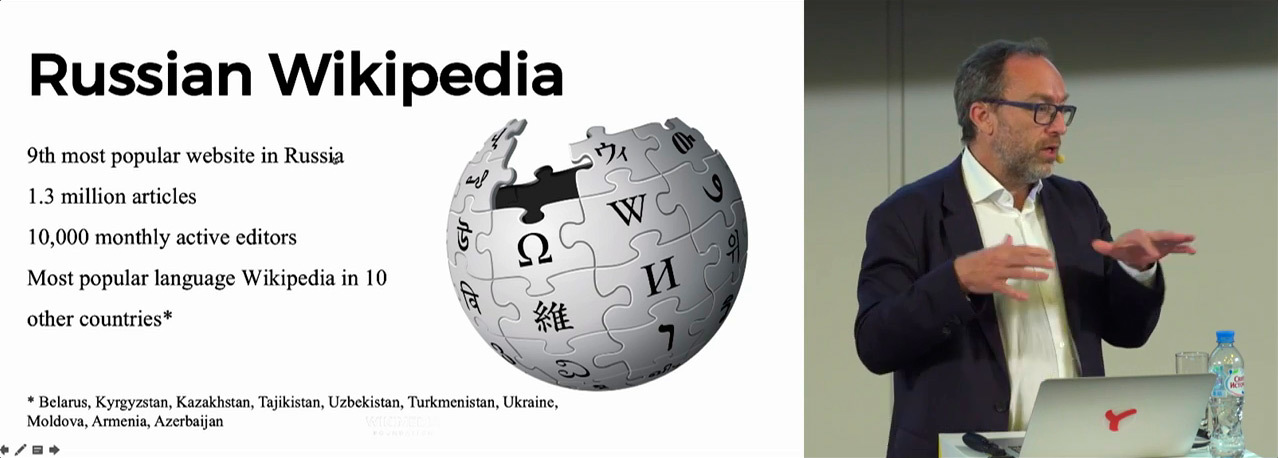
Now let's talk about Russian Wikipedia. In Russia, this is the 9th most popular website; it contains 1.3 million articles, which is quite a lot. Active editors - 10,000 per month. But what is especially interesting: Russian Wikipedia is the most popular among others in 10 countries. There is a list here: Belarus, Kyrgyzstan, Kazakhstan, etc. Most often, although in the listed countries there is, of course, its own language and its own Wikipedia, but it is rather small - because its language group is small. Russian - on the contrary, a large regional language. Local people may first look for something on their Wikipedia, but they don’t find it, and then they use Russian. In this context, Russian Wikipedia is similar to French and English: each of them covers a wider area than a single country.
I would also like to tell you about an indicator that I don’t have on this slide. Russian Wikipedia - about 7th in the ranking of the largest. If you find a list where Wikipedia is sorted by size, be aware: such a list is extremely unreliable and you will have to study the matter further. I would not like to criticize, but participants cheat a little on versions in some languages: millions of articles in such Wikipedia are written by bots. In the community, the question about bots is considered controversial, there are pros and cons, but Russian Wikipedia has an excellent indicator of "depth." This is our internal metric that determines whether articles were written jointly or simply published by robots. And Russian Wikipedia is not just big - it is big and full of life. A large community, a lot of active work, discussions, debates, etc.
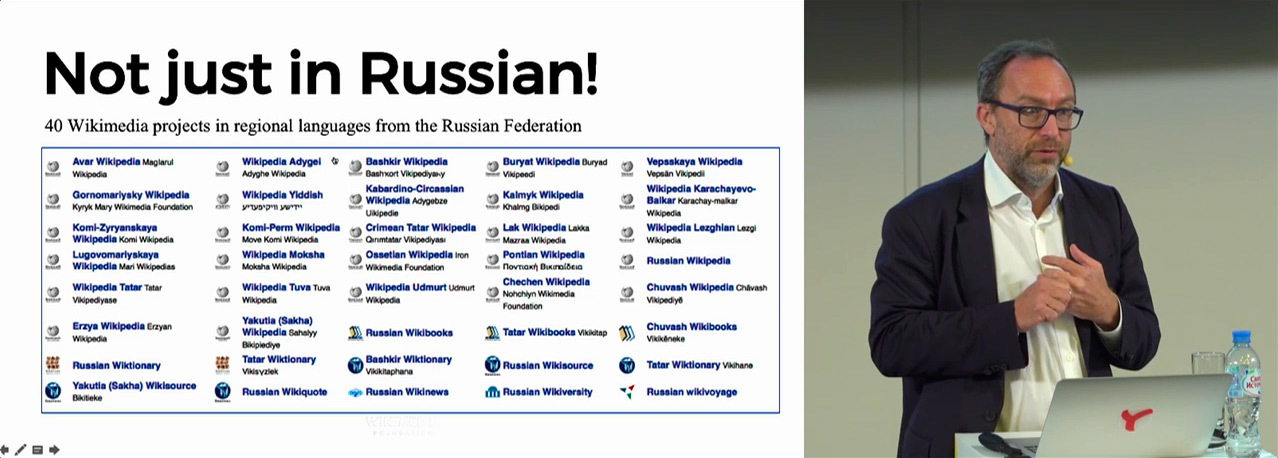
And yet, as we used to say to each person in the language of this person - this is not only in Russian. 40 projects of the Wikimedia Foundation are written in the languages of the peoples of Russia - not so large in scale, but still very strong. We see it all over the world. One of my favorite examples is Welsh. It is a little common in the UK. You can say that no one really needs Welsh Wikipedia and that the vast majority of people who know Welsh also know English - with the exception of a few grandmothers in old villages. But people living in Wales adore the local culture, including their native language, and very much want to keep it and write on it on Wikipedia. Welsh is a great example, because the reason they write on it is neither political nor nationalistic, not a separatist character. The point is their love of knowledge, no more. And this is also very important.
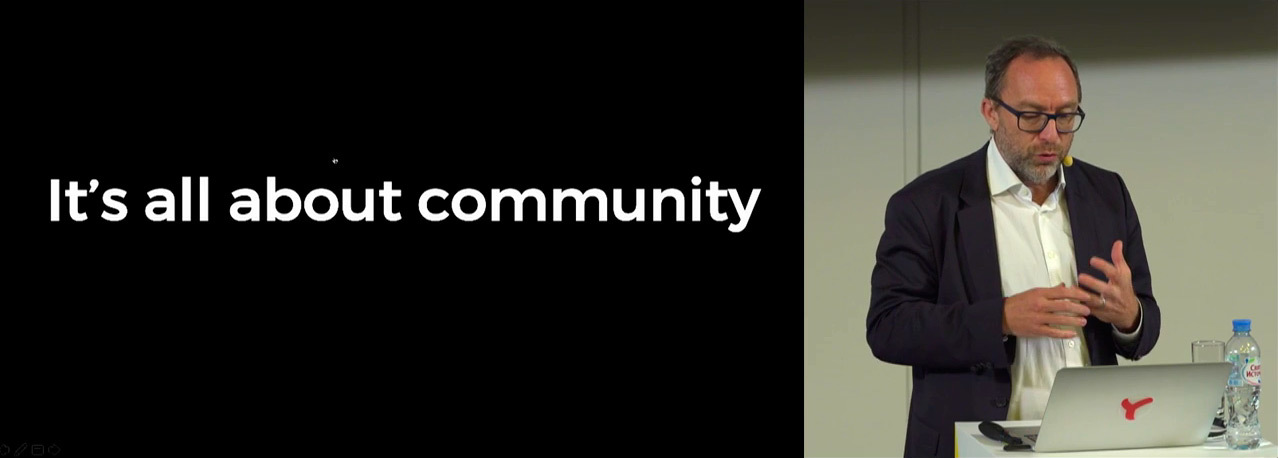
For us, it's all about the community. As I said, we are fundamentally not about technology, but about community. And I would just like to share a few examples of how much energy the Wikimedia community has in Russia. This user, Dmitry Erokhin - is he here? I was told he would come. No? .. He is here, fantastic!
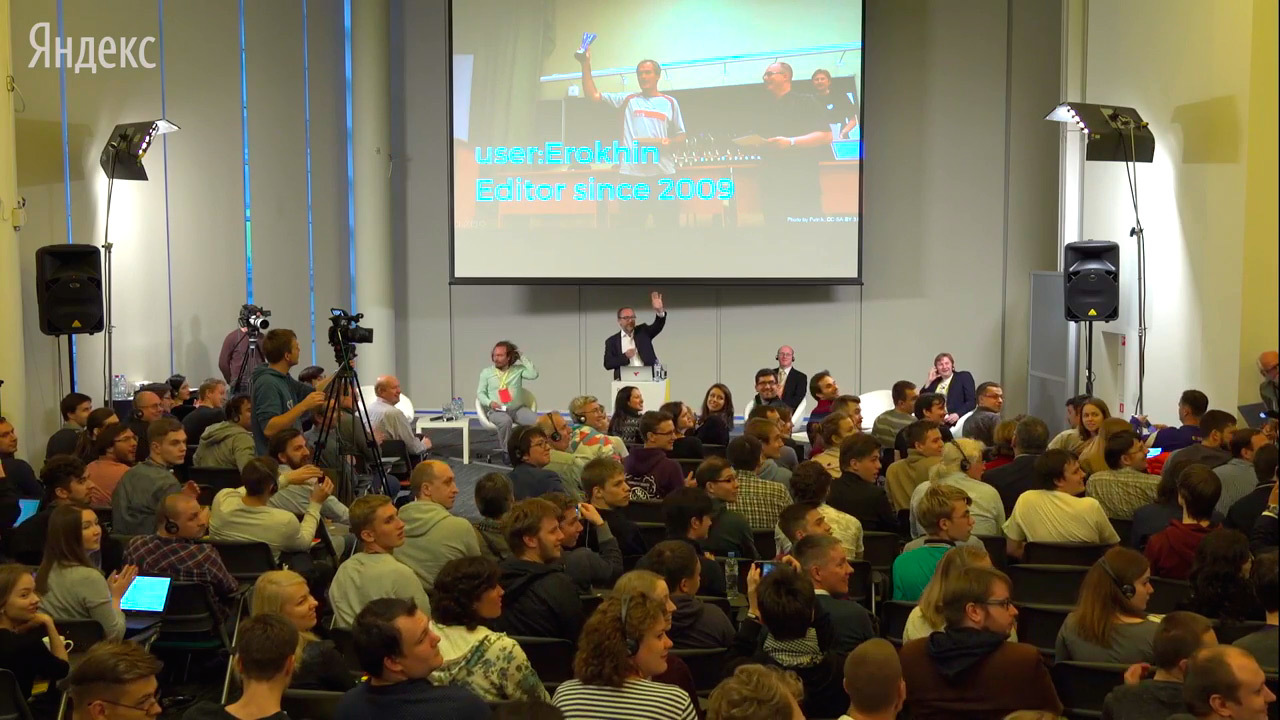
He joined Wikipedia in 2009 and made a huge contribution to its development. In 2013, he wrote a record number of articles - 4294! Yes, I had to print for a long time. For this, he received an award from Wikimedia RU. In addition, he is a marathon runner. Here the story becomes interesting: in July 2016, he single-handedly ran around Lake Baikal in a wiki-expedition format, that is, on the way, he took photographs for the Wikimediah project. On the 28th day of the expedition he was bitten by an encephalitic tick, after which he had to be sent to the hospital. Russian Wikipedians, being members of a very close and good neighborly community, of course, followed this story and sent Dmitry words of support. Fortunately, he recovered and came to us today! Let's applaud him. I am joking on this topic, because our other colleague came today with a broken leg, and he broke it on the recent Wikimmania. Well, editing Wikipedia is a dangerous thing. He himself did not think that such adventures were ahead of him. And here he is. Fantastic, thank you.
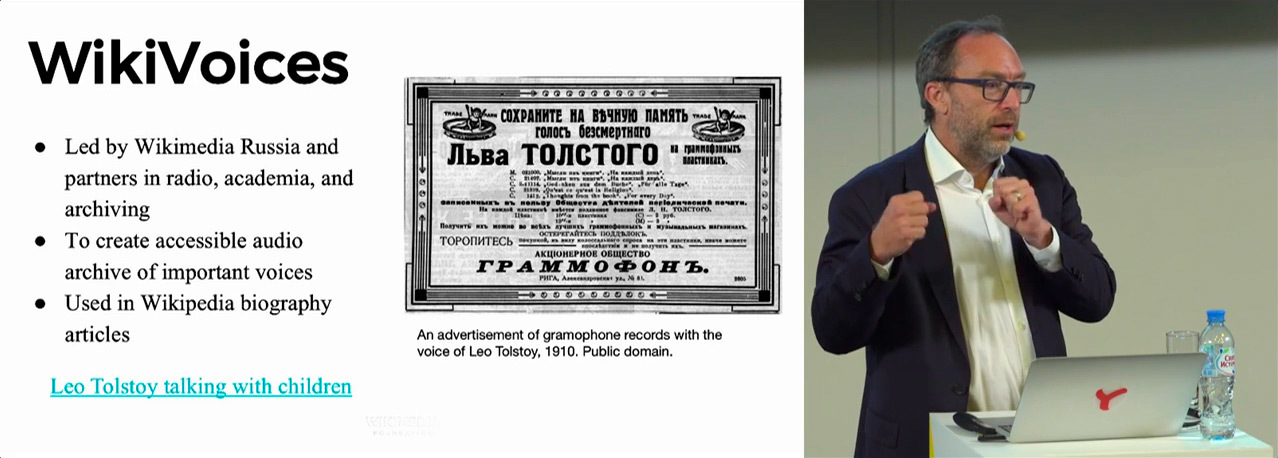
Another example is WikiVoices. This project is managed by Wikimedia RU, and partners include representatives from the radio, academy and archives sectors. The idea is to create an accessible audio archive of voices. These voices are then used in Wikipedia biographies - again, around the world. People who read Leo Tolstoy may be interested in how his voice sounded, so we prepared the corresponding recordings. Such work with archives is very important because it helps to strengthen the knowledge base. Of course, you can ask how such records can be useful if you do not speak Russian? Well, in an academic sense - useful.
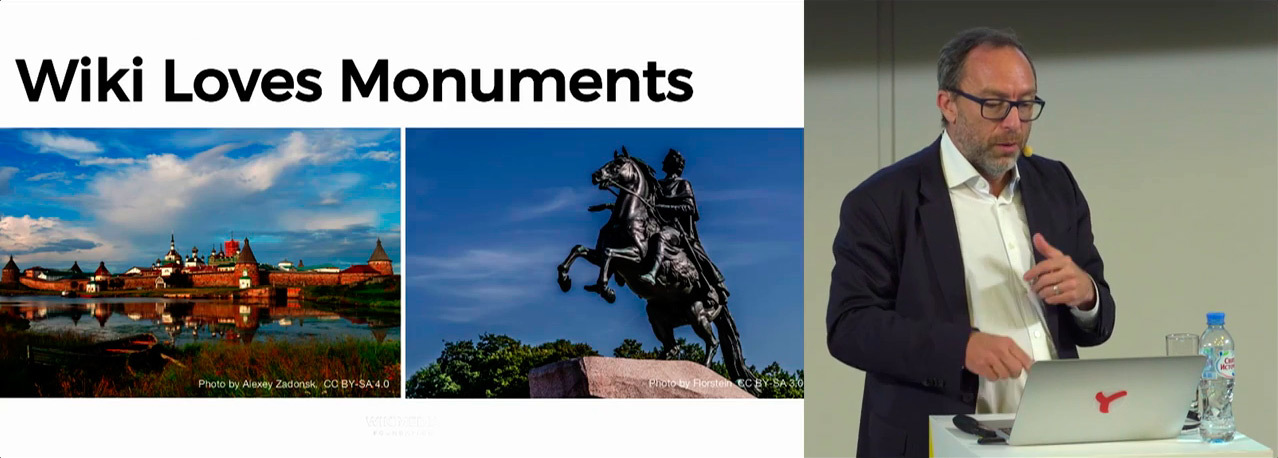
But besides that, we have other, perhaps slightly more accessible projects. Wiki Loves Monuments - our photo contest. Here is a classic example of how decentralized we are. If you think that Wikipedia is similar to Google and solves all questions at its headquarters in San Francisco, and only dictates its point of view to the rest, then your idea is fundamentally wrong.
Wiki Loves Monuments was recently recognized as the largest photo contest in history. This project was a huge success, and it is still ongoing, and its community members have launched. It seems that he started in the Netherlands, became successful there, grew up, information about him was passed on from mouth to mouth - and now we are trying to encourage photographers to shoot monuments, send their photos to the contest, etc. You can immediately see how such knowledge can spread throughout the world. Take at least a photo of something amazing in a small Russian village. People, for example, in Thailand, who would never see it, can now freely study it. Here they are, fragments of the very idea of spreading culture through Wikipedia.

The same can be said about Wiki Loves Earth. This project is rather about an unusually beautiful nature, and it also has a very big success. In the photo - the lake in the Shavlinsky reserve, Altai Republic. Suppose you read an article about the Shavlinsky Lakes in the English-speaking Wikipedia and think - well, yes, there is such a lake, blah blah blah ... But then you see the photo and immediately penetrate - notice the snow in the background, unusually beautiful water, etc. Photos make a very significant contribution to the feelings of Wikipedia and are the part in which we are constantly improving.
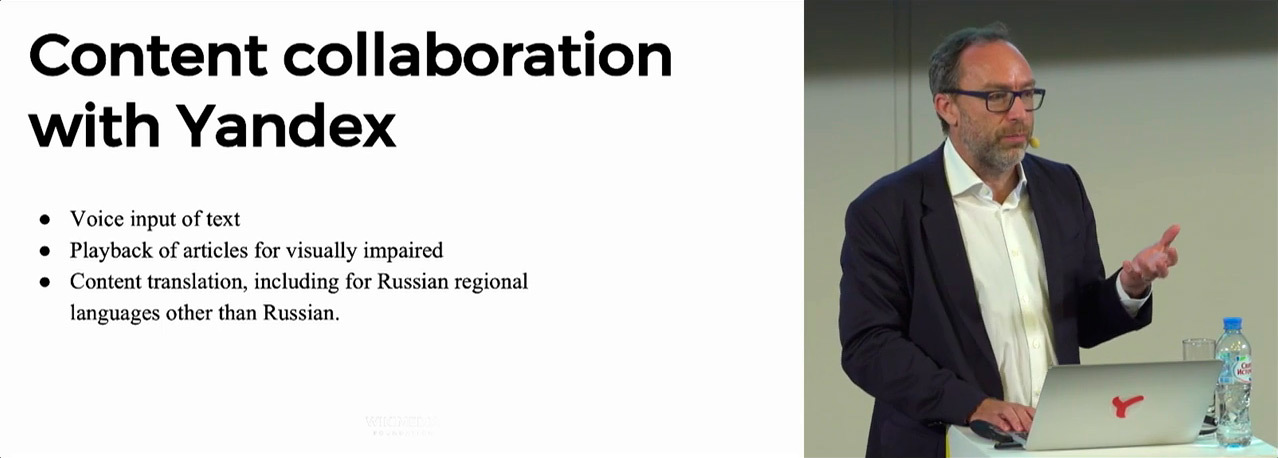
With Yandex, we cooperate in every way on the content line. Voice input of text, reproduction of articles for the visually impaired, translation - all these are very important aspects, but in fact there are much more interaction points. They sent me a complete list of technologies, many of which I have never heard of. It's amazing that we have so many opportunities for cooperation. So I would like to thank the Yandex employees here for your support.
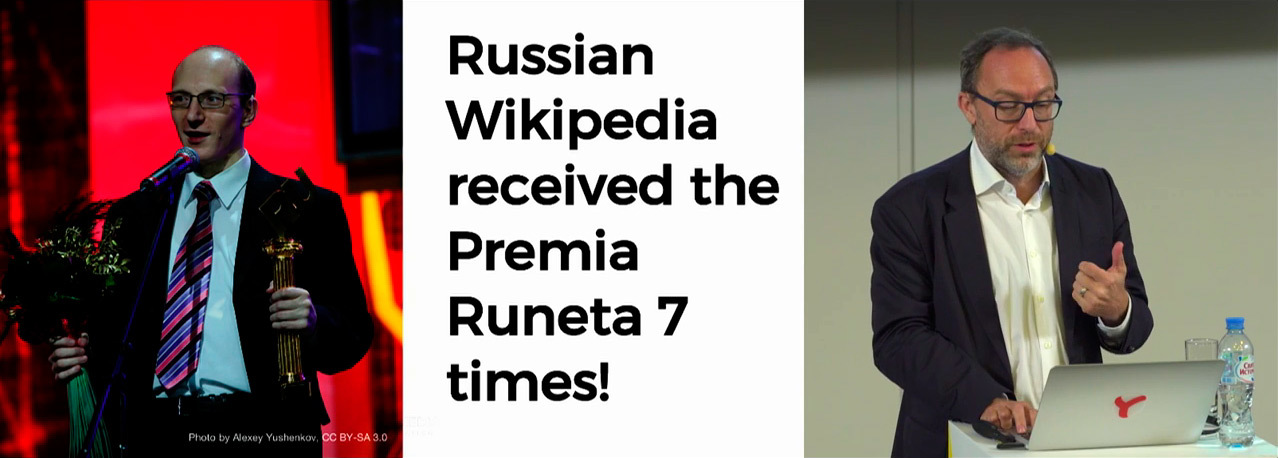
Russian Wikipedia - 7-fold winner of the "Runet Prize". I think you should ban to participate in this competition in the future. It's not fair, you can't win all the time. But all these are very important things, and besides, they are good for the community. In the past couple of years, we have won many excellent awards, such as the Spanish prize of the Princess of Asturias. , , - — . . « , — . — . , ».
— . , , …
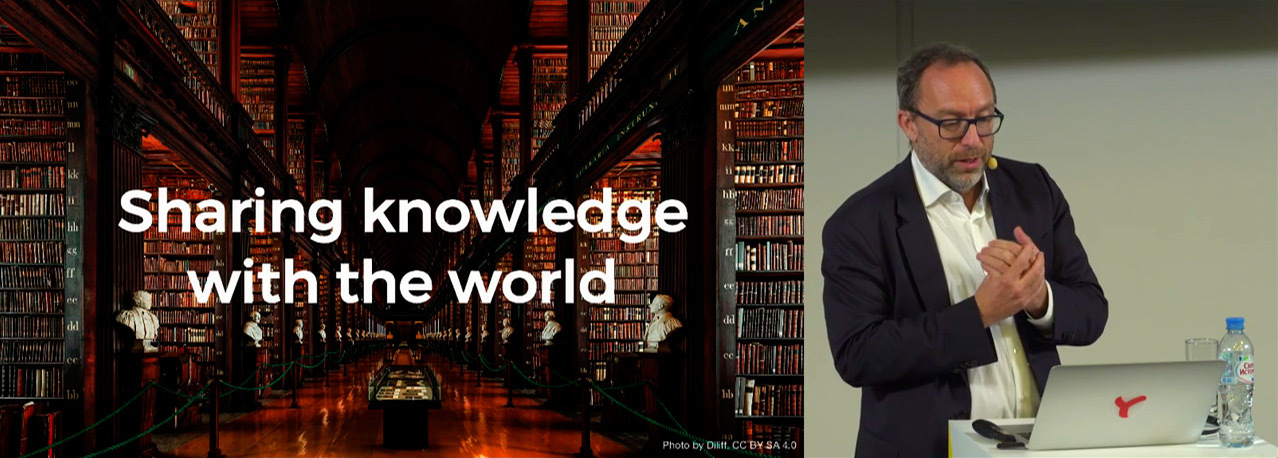
, , - , … , . , , , . , , , , . Thank you very much.
“Good evening, Jimbo. Great to see you here. What do you think about the situation around Wikipedia and Roskomnadzor, as well as about other issues related to censorship and the Russian government? ”Well, this is, of course, a process that I observe very carefully and which causes us very serious concern. But at the same time, in this sense, I remain an optimist. We feel that the Russian government is not interested in blocking Wikipedia, that this is not the course. Yes, we believe that the current situation with laws is not optimal, and we recommend making some changes to them that will help to cope with the situation. For us to allow it means to concentrate on our principles and rules. If there is opposition to drug propaganda, then we agree - because Wikipedia should not contain any kind of propaganda. But this is academic, this is knowledge, this is information, this is something that we consider very important. And we would like to promote the idea that our community has an adequate level of responsibility and thoughtfulness and makes every effort to ensure that information on Wikipedia is compiled from reliable sources and is good.
I consider it important that they love Wikipedia. People really love Wikipedia. She is a part of the world, everyone uses it. And, of course, the government, which may be considering the possibility of blocking Wikipedia, will have to answer a lot of questions from people who say: “Hmm, this is unlikely something harmful and worthy of blocking.”
I am always optimistic ... However, this is a question about which we must continue to talk and think. That is my answer, that's what I think about all this today. I will continue to come to Russia every now and then to talk about it. The fact is that this is a really important occasion. Now we have a question in China - we are completely blocked there. Therefore, in December I went there, participated in several meetings, and we are still negotiating ... But part of the problem is that Wikipedia has a fundamental mission, which is to disseminate knowledge from high-quality sources. And if we make compromises with these principles, then we slide into a completely useless way of development - we will become something that cannot become. So let's hope for the best.
Ivan Zasursky:
- How do you feel about wikipedia, written by robots? So they say about the Swedish, Dutch and other languages.
Jimmy:
- Yes, I talked a little about this in the report, but I should say something else. “Wikipedia articles are written by robots,” sounds optimistic, as if talking about artificial intelligence or something like that. But in fact, this story is more about patterns and databases. You can find a database with data on some topic, such as animals or insects, apply a template to it and create many articles. This is an interesting question, because usually one of the arguments is: if the template is verified by the community, then it will not do any harm. But there is another side to the coin: if there are too many such cases, then too much of Wikipedia will start to look like a poorly written robot, which is also not very good. I try to keep in the middle - I think that this should be decided separately for each language. Such articles strain me a little, but the reasons for such an attitude are not connected with anything, really worth worrying about. The fact is that I always considered its size as an indicator of Wikipedia activity, and now there is no point in this: one of the largest Wikipedia, larger than Russian, is written in a language I have never heard of - and I heard about almost all languages. When you see such a thing, you say: listen, but after all, such Wikipedia cannot be called a bigger one.
Another aspect that people worry about is when articles written by bots become too much even at the growth stage of a single Wikipedia. Thus, the growth of the community is killed, because people no longer feel the responsibility for creating content. So this is a tough question.
Ivan:
- Asks a guy from Siberia: Jimmy, how often do you use Wikipedia yourself?
Jimmy:
- (laughs) Every day. Other days are scarce. I am always interested in the fact that if you look at the statistics of some comScore for countries where we are very popular ... The last time I checked, Austria, Canada were among the leaders ... well, if you look at the statistics, it turns out that our coverage is 38-40%. Someone told me: isn't it surprising that 38% of people in Canada use Wikipedia every month? And I answered: in general, it is strange - what are the remaining 60% busy with? How can you spend a month on the Internet and never go to Wikipedia? I can not understand this. With any search, the first thing you see is hers. But in fact, these figures suggest that many do not engage in information retrieval. Maybe they do shopping, chat with friends, watch the mail - they don’t look like a geek like me who thinks: Oh, Queen Victoria, we should read about her ... So yes, I, like everyone, use Wikipedia every day .
Ivan:
- Russian professors look down on Wikipedia. How does the attitude to Wikipedia change in countries where it is becoming fuller and fuller, where the community grows - for example, in Great Britain and the States?
Jimmy:
- Yes, we really see changes. They occur with the growth of Wikipedia itself, with the growth of quality, but also with the growth of the understanding of professors, with the realization of the bitter fact that students cannot be forbidden to use Wikipedia. It’s like to stop them from listening to rock and roll. Wikipedia is undoubtedly used by 100% of students. I will say this: the question is not whether students should use Wikipedia, but how they should use it. We need to explain to students, what are the links, what are the weaknesses, how to determine the quality of a particular article in Wikipedia. For most research projects, Wikipedia is a good starting point, but a bad end point. You can navigate through it to dig deeper - and this is an important part of our work. If we talk about quoting Wikipedia in scientific articles, then my goal is not that, but the reason is the same, according to which, in my institute, it was forbidden to quote Britannik. And this is despite the fact that Britannica is a high-quality traditional encyclopedia. It's just that you are no longer 12 years old, you are in college, and, to be realistic, the encyclopedia is for another. But I see how attitudes change, everywhere. Most people today occupy a reasonable position - even, I am sure, in Russia.
Ivan:
“So, good advice is to refer to articles mentioned on Wikipedia rather than Wikipedia itself, right?”
Jimmy:
- Exactly. Besides, the point is exactly how you use Wikipedia. I always give one example. Imagine that you are studying at literary courses and reading a novel about the Second World War, about the Ardennes operation. And you think: hmm, the Ardennes operation ... probably, we went through it in history, but I don’t remember almost anything ... So you find a Wikipedia article that is long and of rather good quality, and then you return to reading the novel with a deeper understanding of what the soldiers felt, what was happening in those times. And then the novel - with the emotions of the characters, with its symbolism, etc. - acquires a new meaning for you, since you now know the context. Finally, when you begin to write your term paper after this, you will not quote Wikipedia because there is nothing to quote. But she gave you the background, and this is her strength.
Viewer:
- Jimbo, when answering the question of censorship you, I understand, said about some social responsibility of information. For me personally, this question is very important, because from the opinion that prevailed for a very long time in Russian Wikipedia, it was assumed that any information that I managed to scrape up somewhere should be publicly available. For example, we had a big debate on drugs. There is information in the specialized literature - for doctors, narcologists, drug police. And Wikipedia is another resource, publicly available, 0+, for any categories of citizens, and here we had a very big debate in Russian Wikipedia about how this information may or may not be there and how it should be presented. If I correctly understood from your answer, you said that the information should have elements of social responsibility. For me, this is a very big and difficult question, I fought over it for a very long time. How to keep a delicate balance between, on the one hand, a very large openness and publicity and, on the other, security of information? Would love to hear your opinion.
Jimmy:
- Including it is worth remembering that not talking about complex issues in society would, on the contrary, be socially irresponsible. There are many topics where the best solution to complex problems is learning. Take, for example, methamphetamines. If someone writes a note on the Internet that justifies and promotes the use of methamphetamine, I hope people will eventually come to Wikipedia and read about all the threats to life, about addiction. This is the balance that is needed. A person, in order not to be deceived by a drug dealer or someone else, needs high-quality information. The bottom line is not to keep information about drug use anywhere, but to have quality information. Then people will gain a deeper understanding of the problem. This is the way forward.
Obviously, there are many questions that we can argue about for hours - because we are Wikipedians and we really argue a lot about how to present information, how to make sure of our own honesty and neutrality, as well as quality. But I think that information presented in the form of facts is very rarely dangerous per se. The bigger threat is that people do not have access to the facts, because people without such access become vulnerable to a lot of bad ideas.
Ivan:
“It may also be worth adding that there is no censorship on Wikipedia.”
Jimmy:
“Well ... there is no censorship on Wikipedia, but there is an editor’s judgment.” This is a topic about which I really like to talk. For example, in the English-speaking Wikipedia, this happens often. People come and say: look, they have removed this and that, how they dared, this is censorship! And I answer: in fact, this is just a judgment that such information is invalid, insufficiently substantiated, too simple, or that it is personal data that were not collected correctly enough or are out of public interest.
We often see this in ... I will give a classic example, although it does not relate to information security. Take a political figure from a small town, the article about which in Wikipedia is so long. And here is such a part of the article (about half - approx. Ed.) Is devoted to the son of this politician, who fell under arrest while intoxicated. Looking at the article, you say: in general, this politician was a member of the city council for 30 years and nothing reprehensible in his career can be found. He is just a person who works in the city council. And the fact that information about his son was able to collect, does not make it valid. You can remove it and say - this part is irrelevant biography of the person about whom the article is written, and contains personal data, and not even about him, but about his son. These are the edits we call the judgment of the editor. Someone would call it censorship. But no, it’s not censorship, it’s just a judgment that a story about a son doesn’t improve his biography. In such cases, people need to remember that Wikipedia is not a dump for any possible information. Wikipedia is about quality, thoughtfulness. But we are very open and, I think, we will continue to be such, even if some authorities do not like it.
Viewer:
- Wikipedia is a great project, all my friends know about it, but almost none of them knows about the OpenStreetMap project. Why aren't you integrating with OpenStreetMap? Why don't you add them to you? Why don't you share some information with them? And so on. The fact is that everyone in the modern world should know about the project OpenStreetMap.
Jimmy:
- Personally, I really like the project OpenStreetMap. We cooperate with them and, I think, we can seriously expand our cooperation. So, I think, there is no resistance. In addition, over the years we have improved in terms of partnerships and associations. We used to be so-so in this part. We did not have the resources. People said - why don't you do this and that, and we answered - we have no resources, our website barely works. Now the situation has improved, we are proactive, we have a team responsible for partnerships, etc. I don’t know exactly what the current status of our relationship with OpenStreetMap is, but, in principle, I agree with you. How do you like that answer?
Viewer:
- Hello, Jimmy, my name is Alexander. The question concerns the hospitable home in which we have gathered - Yandex. Do you track traffic from search engines, analyze it, look at this data?
Jimmy:
- Well, yes, we have a team of analysts who look at such data. I have no ideas myself. I would like to have some statistics with me, something useful, but I have nothing like that. However, you can talk to Wikimedia RU representatives, they are also present here.
Spectator:
- Hello, Jimmy. Many participants of the Russian Wikipedia are faced with the fact that there are a number of articles in which a group of administrators do not allow to make any changes, changes and additions. Such articles are characterized by extremely negative or positive content. When trying to neutralize the article and bring it into line with the rules of Wikipedia, participants are blocked. In confirmation of this fact, you can, for example, analyze the work of the participants Tempus and Kinoker (illegible, perhaps another spelling - ed.). The most controversial article was about Falun Gong (inaudible - ed.). The debate continues for more than eight years. Any changes to the article that make it neutral are rejected. Translations of articles from other languages, translations of other articles on Falun Gong, documents such as the resolution of the European Parliament and the resolution of the United States Congress on Falun Gong, etc. The arbitration committee, which has been approached many times, did not help either. But the edits are still rejected, and the article is extremely negative and sharply different from the articles on Falun Gong in 49 languages of the world. We see extreme bias and violation of Wikipedia rules. How to solve this issue? Thank.
Jimmy:
“I know nothing about this particular problem, but I would like to know more.” I am always interested in such cases. But in general, we see this in many places, and there may be many reasons why some changes are temporarily blocked. It so happens that the question is particularly controversial and causes a particularly emotional reaction in some people. Such clashes are not very consistent with the spirit of Wikipedia cooperation, so we are often forced to put protection on some articles - just so that everyone can calm down, after which it will be possible to return to solving the problem. In other cases, people pursue their own goals. The idea of neutrality lies at the very core of Wikipedia. Most immediately understand this. However, if we are talking about a question on which I personally can speak ardently, it often happens that neutrality in itself is uncomfortable to me.
I will give you my personal example. I do not want to talk about politics, but if I go to read about Donald Trump, then it’s better not to allow me to edit. The fact is that I get upset, start to show emotions and can no longer be neutral.
I have listed several situations that can happen every now and then. There are many cases, they are different and occur all over the world. For example, I know many cases in the English Wikipedia, when the problem may not be so serious, but in trying to solve it, the community sometimes goes too far. The fact is that it gets tired of the debate. I believe that it is necessary to carefully begin to study the issue on a new one. There is always a way. For specifics, you should talk to representatives of the Russian community.
Ivan:
- Is the Trump article now closed for editing?
Jimmy:
- Most likely no. Usually, articles about the main political figures are under the so-called midfield. This means that you cannot just appear and start editing - this will create a lot of problems. But we are prone to openness. We are obliged to be open, because the news appears constantly, all the time there is a new information.
“Does Wikipedia have any problems other than financial ones?” Tell us how we can help improve Wikipedia? ”Let's talk a little about finances. We always need to be very serious about fundraising. We are a charitable, non-profit organization. We exist mainly due to small donations. Yes, we also accept major contributions and are always very grateful for them. However, we are financially stable. Once again - fundraising is important for us, but we manage the organization very carefully, try to bear financial responsibility, keep a small budget, etc. So, in this regard, everything is fine. , . , , , . , .
, , . , , … . : . . — , , . , - , . . — - , , , . , , - , - , - . . , , , . . , , .
— . , , -. . , , .
:
— — ? , , -. . . — . , ? ? .
:
— , . . , . , , . , .
, , , . , — . , , , . — , - .
. , YouTube-, — . , , , , -. , , — , , . , , Google , . , , . , , . , , , , — . , — , , .
. , Disney 30- , . Disney , , . , 15 . , 14 , . 70 95, . . , ! ! , , , , . .? !
. , — . …
:
— .
:
— , .
, - , — , … , , . , , , . , , , , . — . , , , . .
:
— . ?
:
— , , , , . . , — . . — , — . , , , . , , — , . . , - , , , . - .
, , , — ! , , , .
Version with simultaneous translation into Russian
In Moscow, wonderful. I came to talk personally and online with Russian members of the Wikimedia community, as well as with everyone else - the general public, the technology community. Also, there are, of course, quite a few people from Yandex. Yandex has always been a very good friend of Wikipedia. We appreciate it. We are also here to acquaint you with the leaders of the local community and our representation. They are ready to discuss cooperation, development directions, ideas, ways of working together. I want to thank Vladimir [Medeyko] for helping to organize this event. Great to be here.

Now in Russia, September is the month of returning to school. Personally, I love this time of year very much - I have a 5-year-old daughter, which is just the time to start studying at school. In addition, an exciting holiday atmosphere is hovering in the air, like at Christmas, and even now the last warm days before winter comes.
')

So, personally, I would like to talk today about education, technology and education. I, among other things, find it very interesting that on September 1 here is the Day of Knowledge. I think this is a great, amazing idea. I would like to see such a holiday in other places. Of course, the day of returning to school is a great event anywhere, but turning it into a holiday is a great way to highlight the very idea of gaining knowledge, learning, seeking to delve into something.

The idea of learning, of course, is fundamental to Wikipedia and everything we do. My initial presentation of the concept of Wikipedia is: "Imagine a world where every person on the planet has free access to all human knowledge." And on the slide is the larger-scale mission of the Wikimedia Foundation. It is a bit different, since it is intended to emphasize that it is not only an encyclopedia and access to knowledge, but also the participation of people, in the “free exchange of all human knowledge”. This is really the main point. We share the vision of the future and believe that knowledge is the basis, that for stability, peace and freedom in society, people should be as informed and as objective as possible. We are, of course, aware that the world is full of complex conflicts. But through the Wikipedia community, we see that ordinary people are maximally open to receiving knowledge from other people and spreading their knowledge.

In the media, the situation is slightly different than ours. Most of the media have an agenda, take someone's side, etc. We, in turn, want to step back a bit and say: no, let's be as calm as possible. Everyone knows the style of Wikipedia. We give you the facts, explain the point of view of both parties, do not force you to believe in one or the other. The key part has always been just that, but to achieve this, the Internet communities need a framework for sharing knowledge. Wikipedia works including the fact that there are connections between different communities and that we all use the same platform and free licenses - this is an important point, I will tell you more about it. Free licenses allow you to distribute and transfer knowledge.

I find it sad that Wikipedia is considered a history of technology and is placed in the same category with Google, Yahoo !, Yandex, Baidu and other companies around the world. Yes, we, of course, use the technologies of the web and our open platform, and they allow the community to unite. But in reality, the heart and soul of Wikipedia is the community itself. Fundamentally, we are not a technological organization. Although we have a team of excellent engineers and other specialists, technologically we are extremely small. But as a community of volunteers, we are so global and international that if you want to understand Wikipedia, you need to think of us rather as a cultural group, cultural institution, and not as a technology company - because we are not.

Some of our principles are about accessibility. If you go back to the presentation of the concept, then there we are talking about every person in the world. Wikipedia in our understanding is global by nature. We want everyone to have access to knowledge. And this - this is a rather interesting fact - means that we are also very local. It would be absolutely unrealistic to manage the work of the Russian Wikipedia from San Francisco. Each local version of Wikipedia is written by people in their language. Therefore, the idea that Wikipedia for some reason is an American project does not bear any truth. Wikipedia is very local and very global.
We warmly welcome accessibility, especially for people in developing countries. Since we are doing charity work, we are really looking forward to when the next billion people get online, and we want to understand how these people will get access to Wikipedia. One of the stories that I am always happy to discuss is the Wikipedia Zero project. As part of it, we work with mobile operators to provide people in developing countries with access to Wikipedia without billing traffic. It is very important. We know that not everyone has access. In theory, people with access should become more and more, since the price of a simple Android phone is significantly reduced each year, but network charges are still quite high. Wikipedia Zero - just about that. When we opened the project and announced it in several countries, an amazing thing happened by itself: a group of teenagers from South Africa launched an online petition asking local operators to make access to Wikipedia free. I'll show the video, but I need help. As I said, we are not a technology company, so I am not very good at handling computers.
Children :
- Hello. We wrote this letter together with my classmates to get free access to Wikipedia. Here is how it sounds.
Open letter to Cell C, MTN, Vodacom and 8ta. We are students of the 12th grade at Cinenjong High School, Joe Word Park, Milnerton, Cape Town. We recently heard that in some other African countries, such as Kenya and Uganda, cellular service providers provide customers with free access to Wikipedia. We think this is an excellent idea, and we want to encourage you to do the same here in South Africa. There is no library in our school. 90% of us have mobile phones, but we cannot afford the Internet. Free access to Wikipedia would play an important role for us. Wikipedia is one of the best sites that can help us in learning. There is information on almost any topic. Think of the impulse that we, the students, and the entire educational system of South Africa can get. Our education system needs help, and access to Wikipedia will play a very positive role. (Children repeat “Thank you.”)
Jimmy :
- I am pleased to announce that just three months after the video was published, one of the operators - it seems MTN - fulfilled the request and recorded a very nice video in response.

This is just one of the projects we work around the world with the goal of providing access to knowledge. I think it is important to think about the difference between information and knowledge. We obviously live in a world full of information. It is also not parsed, not sorted, it is very much, and so on. But we are trying to condense this information on Wikipedia in order to distribute it and make it available in a more intelligent form. We are talking about a lot of academic work. It would be difficult for people to access the data and understand them without someone who would take and write them in neutral language, lowering the entry threshold for everyone else. This is really quite important. Since we have become part of the global infrastructure, we feel very serious and big responsibility for ensuring that Wikipedia is as good as possible. We want Wikipedia to become a key element in obtaining knowledge by all people, which means that it should be as reliable as possible, etc. Since our writers are only volunteers, it is important for us that our community has certain principles.

Here are a few facts - many in this room are already familiar with them. We started in 2001, we now have 41 million articles, every month 80,000 volunteers edit Wikipedia. In addition, we are a charitable, non-profit organization.

In a minute I will talk about Russian Wikipedia, but first I’ll quickly say that we have hundreds of languages, that Russian Wikipedia was one of the first to be written not in English, and that 85% of our articles are not English. So when people think that Wikipedia is basically an English-language project ... I remember many years ago I was in Germany and participated in a panel discussion with one professor, talking about the global nature of Wikipedia. He then put it very expressively: “Yes, but it’s unfair when Wikipedia is written in English and then simply translated into German.” And I answered: “Actually, it is not translated - it is written by the Germans immediately in German,” and in the same way it is written by Russians in Russia. This is very important for many reasons.
Think about the context of knowledge. You need to understand the reader. If I want to read about, I don’t know, Bollywood films and I will read about them in Hindi ... In Hindi, you can accidentally mention something and understand it all, because they have the same cultural heritage. But in English, you may need to clarify something, indicate who you are talking about. This difference is just a few words, but you still need to adjust, otherwise the result will be different depending on the language of the reader. Therefore, it has always been important for us that the version in each language is unique and meets the needs of the local community.

In our global nature, we are not just Wikipedia. We have a whole set of content projects. Dictionary, Wikisource, Wikimedia Commons, Wikibooks, etc. Knowledge has many aspects. Wikipedia is, of course, the most famous and successful, but other projects play their own role, independent of Wikipedia, although they also serve as a support structure for it. So if you look a little deeper, it turns out that we have a lot of things happening in all these projects.

In addition, Wikipedia is also a powerful social movement. I love this photo - it was taken in the summer of 2016 in Italy, at our Wikimania conference, which we hold annually in different cities of the world. The competition for choosing a city is like a lottery before the Olympics, and I hope that someday we will be able to come to Moscow - it would be wonderful to hold a conference here. Every year we invite volunteers from all over the world - they come and share their valuable experiences. Some say - in our language we are confronted with such and such a problem, others respond - yes, we also have it, that's how we fight it and, imagine, we tried such-and-such methods, some helped worse others are better ... So volunteers get together to learn from each other, learn to cooperate, learn to use resources that are already used by others, etc.

So what lessons have we learned? What did we learn from Wikipedia? A lot of everything. For example, that knowledge is born together.

It is very important that knowledge is local in nature, concrete, comes from many people and from many cultures. That when we work together we can achieve higher quality. That the model of working together on Wikipedia, as economists have proven, leads to results comparable to traditional encyclopedias, but on a much larger scale. When people are interested in Wikipedia model or doubt it, I always answer: once we look back, look at the traditional model and say - wait, this whole book was written by one person and tested by two more? I got used to content checked by hundreds of people who had been discussing every word for a long time - because they wanted to achieve maximum quality. Yes, such an open editing system obviously creates a lot of noise. Sometimes there are mistakes, etc. But it was always important for us to emphasize that we need to work together. This is a global project that allows us all to unite and exchange knowledge among themselves.
We also understood that knowledge grows, being free. In the word "free" I put the same meaning as in open source, that is, we are talking about free licenses. Everything on Wikipedia must be licensed in as free form as possible - so that you can copy, edit and distribute any piece, including in an already modified form. And your goal can be both non-commercial and commercial. Having the ability to use Wikipedia to create various tools that help spread knowledge further than if we were tightly controlled, is a great blessing for commercial organizations. We want Wikipedia to be used again and again, this is very important.
What we should think about in the context of the entire Internet is its original spirit. His spirit was open exchange and collaboration. Now in many parts of the world there are many questions about this - they relate to the possible fragmentation and regulation of the Internet. As a result, these questions will affect him pretty much. Most people are not interested in them, but I think we should be all the same.
As I said, free licenses play a big role here. And one of the processes in which we have succeeded very much is working with galleries, libraries, archives and museums. We encourage them to use free licenses.
Here is another example of how local work brings global benefits, how local knowledge — for example, created by the local cultural community — begins to spread throughout the world through interaction with us and the introduction of a free license. I know that there is such a project in Russia, and I’ll tell you about it a little later. But for now let's talk about Bergen - a city in Norway. According to the old local tradition there is an annual festival where young drummers compete. Colorful banners are hung everywhere ... The Norwegians talked about this festival in their place - in the Norwegian, very local version of Wikipedia. But besides that, they translated the article into English, and already someone translated it from English into French, German, etc. As a result, the whole world will learn about the festival. In other words, Wikipedia gives people working locally the opportunity to tell their world about their traditions, ideas and culture. And free licenses are a key element of this extraordinarily powerful process.
Since, as already mentioned, we are closely monitoring the quality, a very important condition for us is the availability of reliable sources. We need them, whether they are good newspapers, magazines or academic publications. Wikipedia in many ways becomes their reflection. Therefore, in a situation where the sources are unreliable, Wikipedia is also difficult to call reliable. Personally, I think this is a very large-scale problem for society. It is important for us to make sure that we have strong academic institutions and a strong press that produces high-quality materials.
And this is what happens: co-created knowledge is credible. Let not until the end, even if not completely. The best studies suggest that Wikipedia has the same quality as traditional encyclopedias, especially in widely used languages. For example, one of the studies was done for the German language. When German Wikipedia won in comparison with a traditional and high-quality publication like Brockhaus, it was a big event for the local community, simply because they were eager to do everything right.
The world is constantly changing, it does not have a final point, so you should always be ready to continue to cooperate - edit, improve, recognize past mistakes, improve everything stronger and stronger.

Now let's talk about Russian Wikipedia. In Russia, this is the 9th most popular website; it contains 1.3 million articles, which is quite a lot. Active editors - 10,000 per month. But what is especially interesting: Russian Wikipedia is the most popular among others in 10 countries. There is a list here: Belarus, Kyrgyzstan, Kazakhstan, etc. Most often, although in the listed countries there is, of course, its own language and its own Wikipedia, but it is rather small - because its language group is small. Russian - on the contrary, a large regional language. Local people may first look for something on their Wikipedia, but they don’t find it, and then they use Russian. In this context, Russian Wikipedia is similar to French and English: each of them covers a wider area than a single country.
I would also like to tell you about an indicator that I don’t have on this slide. Russian Wikipedia - about 7th in the ranking of the largest. If you find a list where Wikipedia is sorted by size, be aware: such a list is extremely unreliable and you will have to study the matter further. I would not like to criticize, but participants cheat a little on versions in some languages: millions of articles in such Wikipedia are written by bots. In the community, the question about bots is considered controversial, there are pros and cons, but Russian Wikipedia has an excellent indicator of "depth." This is our internal metric that determines whether articles were written jointly or simply published by robots. And Russian Wikipedia is not just big - it is big and full of life. A large community, a lot of active work, discussions, debates, etc.

And yet, as we used to say to each person in the language of this person - this is not only in Russian. 40 projects of the Wikimedia Foundation are written in the languages of the peoples of Russia - not so large in scale, but still very strong. We see it all over the world. One of my favorite examples is Welsh. It is a little common in the UK. You can say that no one really needs Welsh Wikipedia and that the vast majority of people who know Welsh also know English - with the exception of a few grandmothers in old villages. But people living in Wales adore the local culture, including their native language, and very much want to keep it and write on it on Wikipedia. Welsh is a great example, because the reason they write on it is neither political nor nationalistic, not a separatist character. The point is their love of knowledge, no more. And this is also very important.

For us, it's all about the community. As I said, we are fundamentally not about technology, but about community. And I would just like to share a few examples of how much energy the Wikimedia community has in Russia. This user, Dmitry Erokhin - is he here? I was told he would come. No? .. He is here, fantastic!

He joined Wikipedia in 2009 and made a huge contribution to its development. In 2013, he wrote a record number of articles - 4294! Yes, I had to print for a long time. For this, he received an award from Wikimedia RU. In addition, he is a marathon runner. Here the story becomes interesting: in July 2016, he single-handedly ran around Lake Baikal in a wiki-expedition format, that is, on the way, he took photographs for the Wikimediah project. On the 28th day of the expedition he was bitten by an encephalitic tick, after which he had to be sent to the hospital. Russian Wikipedians, being members of a very close and good neighborly community, of course, followed this story and sent Dmitry words of support. Fortunately, he recovered and came to us today! Let's applaud him. I am joking on this topic, because our other colleague came today with a broken leg, and he broke it on the recent Wikimmania. Well, editing Wikipedia is a dangerous thing. He himself did not think that such adventures were ahead of him. And here he is. Fantastic, thank you.

Another example is WikiVoices. This project is managed by Wikimedia RU, and partners include representatives from the radio, academy and archives sectors. The idea is to create an accessible audio archive of voices. These voices are then used in Wikipedia biographies - again, around the world. People who read Leo Tolstoy may be interested in how his voice sounded, so we prepared the corresponding recordings. Such work with archives is very important because it helps to strengthen the knowledge base. Of course, you can ask how such records can be useful if you do not speak Russian? Well, in an academic sense - useful.

But besides that, we have other, perhaps slightly more accessible projects. Wiki Loves Monuments - our photo contest. Here is a classic example of how decentralized we are. If you think that Wikipedia is similar to Google and solves all questions at its headquarters in San Francisco, and only dictates its point of view to the rest, then your idea is fundamentally wrong.
Wiki Loves Monuments was recently recognized as the largest photo contest in history. This project was a huge success, and it is still ongoing, and its community members have launched. It seems that he started in the Netherlands, became successful there, grew up, information about him was passed on from mouth to mouth - and now we are trying to encourage photographers to shoot monuments, send their photos to the contest, etc. You can immediately see how such knowledge can spread throughout the world. Take at least a photo of something amazing in a small Russian village. People, for example, in Thailand, who would never see it, can now freely study it. Here they are, fragments of the very idea of spreading culture through Wikipedia.

The same can be said about Wiki Loves Earth. This project is rather about an unusually beautiful nature, and it also has a very big success. In the photo - the lake in the Shavlinsky reserve, Altai Republic. Suppose you read an article about the Shavlinsky Lakes in the English-speaking Wikipedia and think - well, yes, there is such a lake, blah blah blah ... But then you see the photo and immediately penetrate - notice the snow in the background, unusually beautiful water, etc. Photos make a very significant contribution to the feelings of Wikipedia and are the part in which we are constantly improving.

With Yandex, we cooperate in every way on the content line. Voice input of text, reproduction of articles for the visually impaired, translation - all these are very important aspects, but in fact there are much more interaction points. They sent me a complete list of technologies, many of which I have never heard of. It's amazing that we have so many opportunities for cooperation. So I would like to thank the Yandex employees here for your support.

Russian Wikipedia - 7-fold winner of the "Runet Prize". I think you should ban to participate in this competition in the future. It's not fair, you can't win all the time. But all these are very important things, and besides, they are good for the community. In the past couple of years, we have won many excellent awards, such as the Spanish prize of the Princess of Asturias. , , - — . . « , — . — . , ».
— . , , …

, , - , … , . , , , . , , , , . Thank you very much.
Questions
“Good evening, Jimbo. Great to see you here. What do you think about the situation around Wikipedia and Roskomnadzor, as well as about other issues related to censorship and the Russian government? ”Well, this is, of course, a process that I observe very carefully and which causes us very serious concern. But at the same time, in this sense, I remain an optimist. We feel that the Russian government is not interested in blocking Wikipedia, that this is not the course. Yes, we believe that the current situation with laws is not optimal, and we recommend making some changes to them that will help to cope with the situation. For us to allow it means to concentrate on our principles and rules. If there is opposition to drug propaganda, then we agree - because Wikipedia should not contain any kind of propaganda. But this is academic, this is knowledge, this is information, this is something that we consider very important. And we would like to promote the idea that our community has an adequate level of responsibility and thoughtfulness and makes every effort to ensure that information on Wikipedia is compiled from reliable sources and is good.
I consider it important that they love Wikipedia. People really love Wikipedia. She is a part of the world, everyone uses it. And, of course, the government, which may be considering the possibility of blocking Wikipedia, will have to answer a lot of questions from people who say: “Hmm, this is unlikely something harmful and worthy of blocking.”
I am always optimistic ... However, this is a question about which we must continue to talk and think. That is my answer, that's what I think about all this today. I will continue to come to Russia every now and then to talk about it. The fact is that this is a really important occasion. Now we have a question in China - we are completely blocked there. Therefore, in December I went there, participated in several meetings, and we are still negotiating ... But part of the problem is that Wikipedia has a fundamental mission, which is to disseminate knowledge from high-quality sources. And if we make compromises with these principles, then we slide into a completely useless way of development - we will become something that cannot become. So let's hope for the best.
Ivan Zasursky:
- How do you feel about wikipedia, written by robots? So they say about the Swedish, Dutch and other languages.
Jimmy:
- Yes, I talked a little about this in the report, but I should say something else. “Wikipedia articles are written by robots,” sounds optimistic, as if talking about artificial intelligence or something like that. But in fact, this story is more about patterns and databases. You can find a database with data on some topic, such as animals or insects, apply a template to it and create many articles. This is an interesting question, because usually one of the arguments is: if the template is verified by the community, then it will not do any harm. But there is another side to the coin: if there are too many such cases, then too much of Wikipedia will start to look like a poorly written robot, which is also not very good. I try to keep in the middle - I think that this should be decided separately for each language. Such articles strain me a little, but the reasons for such an attitude are not connected with anything, really worth worrying about. The fact is that I always considered its size as an indicator of Wikipedia activity, and now there is no point in this: one of the largest Wikipedia, larger than Russian, is written in a language I have never heard of - and I heard about almost all languages. When you see such a thing, you say: listen, but after all, such Wikipedia cannot be called a bigger one.
Another aspect that people worry about is when articles written by bots become too much even at the growth stage of a single Wikipedia. Thus, the growth of the community is killed, because people no longer feel the responsibility for creating content. So this is a tough question.
Ivan:
- Asks a guy from Siberia: Jimmy, how often do you use Wikipedia yourself?
Jimmy:
- (laughs) Every day. Other days are scarce. I am always interested in the fact that if you look at the statistics of some comScore for countries where we are very popular ... The last time I checked, Austria, Canada were among the leaders ... well, if you look at the statistics, it turns out that our coverage is 38-40%. Someone told me: isn't it surprising that 38% of people in Canada use Wikipedia every month? And I answered: in general, it is strange - what are the remaining 60% busy with? How can you spend a month on the Internet and never go to Wikipedia? I can not understand this. With any search, the first thing you see is hers. But in fact, these figures suggest that many do not engage in information retrieval. Maybe they do shopping, chat with friends, watch the mail - they don’t look like a geek like me who thinks: Oh, Queen Victoria, we should read about her ... So yes, I, like everyone, use Wikipedia every day .
Ivan:
- Russian professors look down on Wikipedia. How does the attitude to Wikipedia change in countries where it is becoming fuller and fuller, where the community grows - for example, in Great Britain and the States?
Jimmy:
- Yes, we really see changes. They occur with the growth of Wikipedia itself, with the growth of quality, but also with the growth of the understanding of professors, with the realization of the bitter fact that students cannot be forbidden to use Wikipedia. It’s like to stop them from listening to rock and roll. Wikipedia is undoubtedly used by 100% of students. I will say this: the question is not whether students should use Wikipedia, but how they should use it. We need to explain to students, what are the links, what are the weaknesses, how to determine the quality of a particular article in Wikipedia. For most research projects, Wikipedia is a good starting point, but a bad end point. You can navigate through it to dig deeper - and this is an important part of our work. If we talk about quoting Wikipedia in scientific articles, then my goal is not that, but the reason is the same, according to which, in my institute, it was forbidden to quote Britannik. And this is despite the fact that Britannica is a high-quality traditional encyclopedia. It's just that you are no longer 12 years old, you are in college, and, to be realistic, the encyclopedia is for another. But I see how attitudes change, everywhere. Most people today occupy a reasonable position - even, I am sure, in Russia.
Ivan:
“So, good advice is to refer to articles mentioned on Wikipedia rather than Wikipedia itself, right?”
Jimmy:
- Exactly. Besides, the point is exactly how you use Wikipedia. I always give one example. Imagine that you are studying at literary courses and reading a novel about the Second World War, about the Ardennes operation. And you think: hmm, the Ardennes operation ... probably, we went through it in history, but I don’t remember almost anything ... So you find a Wikipedia article that is long and of rather good quality, and then you return to reading the novel with a deeper understanding of what the soldiers felt, what was happening in those times. And then the novel - with the emotions of the characters, with its symbolism, etc. - acquires a new meaning for you, since you now know the context. Finally, when you begin to write your term paper after this, you will not quote Wikipedia because there is nothing to quote. But she gave you the background, and this is her strength.
Viewer:
- Jimbo, when answering the question of censorship you, I understand, said about some social responsibility of information. For me personally, this question is very important, because from the opinion that prevailed for a very long time in Russian Wikipedia, it was assumed that any information that I managed to scrape up somewhere should be publicly available. For example, we had a big debate on drugs. There is information in the specialized literature - for doctors, narcologists, drug police. And Wikipedia is another resource, publicly available, 0+, for any categories of citizens, and here we had a very big debate in Russian Wikipedia about how this information may or may not be there and how it should be presented. If I correctly understood from your answer, you said that the information should have elements of social responsibility. For me, this is a very big and difficult question, I fought over it for a very long time. How to keep a delicate balance between, on the one hand, a very large openness and publicity and, on the other, security of information? Would love to hear your opinion.
Jimmy:
- Including it is worth remembering that not talking about complex issues in society would, on the contrary, be socially irresponsible. There are many topics where the best solution to complex problems is learning. Take, for example, methamphetamines. If someone writes a note on the Internet that justifies and promotes the use of methamphetamine, I hope people will eventually come to Wikipedia and read about all the threats to life, about addiction. This is the balance that is needed. A person, in order not to be deceived by a drug dealer or someone else, needs high-quality information. The bottom line is not to keep information about drug use anywhere, but to have quality information. Then people will gain a deeper understanding of the problem. This is the way forward.
Obviously, there are many questions that we can argue about for hours - because we are Wikipedians and we really argue a lot about how to present information, how to make sure of our own honesty and neutrality, as well as quality. But I think that information presented in the form of facts is very rarely dangerous per se. The bigger threat is that people do not have access to the facts, because people without such access become vulnerable to a lot of bad ideas.
Ivan:
“It may also be worth adding that there is no censorship on Wikipedia.”
Jimmy:
“Well ... there is no censorship on Wikipedia, but there is an editor’s judgment.” This is a topic about which I really like to talk. For example, in the English-speaking Wikipedia, this happens often. People come and say: look, they have removed this and that, how they dared, this is censorship! And I answer: in fact, this is just a judgment that such information is invalid, insufficiently substantiated, too simple, or that it is personal data that were not collected correctly enough or are out of public interest.
We often see this in ... I will give a classic example, although it does not relate to information security. Take a political figure from a small town, the article about which in Wikipedia is so long. And here is such a part of the article (about half - approx. Ed.) Is devoted to the son of this politician, who fell under arrest while intoxicated. Looking at the article, you say: in general, this politician was a member of the city council for 30 years and nothing reprehensible in his career can be found. He is just a person who works in the city council. And the fact that information about his son was able to collect, does not make it valid. You can remove it and say - this part is irrelevant biography of the person about whom the article is written, and contains personal data, and not even about him, but about his son. These are the edits we call the judgment of the editor. Someone would call it censorship. But no, it’s not censorship, it’s just a judgment that a story about a son doesn’t improve his biography. In such cases, people need to remember that Wikipedia is not a dump for any possible information. Wikipedia is about quality, thoughtfulness. But we are very open and, I think, we will continue to be such, even if some authorities do not like it.
Viewer:
- Wikipedia is a great project, all my friends know about it, but almost none of them knows about the OpenStreetMap project. Why aren't you integrating with OpenStreetMap? Why don't you add them to you? Why don't you share some information with them? And so on. The fact is that everyone in the modern world should know about the project OpenStreetMap.
Jimmy:
- Personally, I really like the project OpenStreetMap. We cooperate with them and, I think, we can seriously expand our cooperation. So, I think, there is no resistance. In addition, over the years we have improved in terms of partnerships and associations. We used to be so-so in this part. We did not have the resources. People said - why don't you do this and that, and we answered - we have no resources, our website barely works. Now the situation has improved, we are proactive, we have a team responsible for partnerships, etc. I don’t know exactly what the current status of our relationship with OpenStreetMap is, but, in principle, I agree with you. How do you like that answer?
Viewer:
- Hello, Jimmy, my name is Alexander. The question concerns the hospitable home in which we have gathered - Yandex. Do you track traffic from search engines, analyze it, look at this data?
Jimmy:
- Well, yes, we have a team of analysts who look at such data. I have no ideas myself. I would like to have some statistics with me, something useful, but I have nothing like that. However, you can talk to Wikimedia RU representatives, they are also present here.
Spectator:
- Hello, Jimmy. Many participants of the Russian Wikipedia are faced with the fact that there are a number of articles in which a group of administrators do not allow to make any changes, changes and additions. Such articles are characterized by extremely negative or positive content. When trying to neutralize the article and bring it into line with the rules of Wikipedia, participants are blocked. In confirmation of this fact, you can, for example, analyze the work of the participants Tempus and Kinoker (illegible, perhaps another spelling - ed.). The most controversial article was about Falun Gong (inaudible - ed.). The debate continues for more than eight years. Any changes to the article that make it neutral are rejected. Translations of articles from other languages, translations of other articles on Falun Gong, documents such as the resolution of the European Parliament and the resolution of the United States Congress on Falun Gong, etc. The arbitration committee, which has been approached many times, did not help either. But the edits are still rejected, and the article is extremely negative and sharply different from the articles on Falun Gong in 49 languages of the world. We see extreme bias and violation of Wikipedia rules. How to solve this issue? Thank.
Jimmy:
“I know nothing about this particular problem, but I would like to know more.” I am always interested in such cases. But in general, we see this in many places, and there may be many reasons why some changes are temporarily blocked. It so happens that the question is particularly controversial and causes a particularly emotional reaction in some people. Such clashes are not very consistent with the spirit of Wikipedia cooperation, so we are often forced to put protection on some articles - just so that everyone can calm down, after which it will be possible to return to solving the problem. In other cases, people pursue their own goals. The idea of neutrality lies at the very core of Wikipedia. Most immediately understand this. However, if we are talking about a question on which I personally can speak ardently, it often happens that neutrality in itself is uncomfortable to me.
I will give you my personal example. I do not want to talk about politics, but if I go to read about Donald Trump, then it’s better not to allow me to edit. The fact is that I get upset, start to show emotions and can no longer be neutral.
I have listed several situations that can happen every now and then. There are many cases, they are different and occur all over the world. For example, I know many cases in the English Wikipedia, when the problem may not be so serious, but in trying to solve it, the community sometimes goes too far. The fact is that it gets tired of the debate. I believe that it is necessary to carefully begin to study the issue on a new one. There is always a way. For specifics, you should talk to representatives of the Russian community.
Ivan:
- Is the Trump article now closed for editing?
Jimmy:
- Most likely no. Usually, articles about the main political figures are under the so-called midfield. This means that you cannot just appear and start editing - this will create a lot of problems. But we are prone to openness. We are obliged to be open, because the news appears constantly, all the time there is a new information.
“Does Wikipedia have any problems other than financial ones?” Tell us how we can help improve Wikipedia? ”Let's talk a little about finances. We always need to be very serious about fundraising. We are a charitable, non-profit organization. We exist mainly due to small donations. Yes, we also accept major contributions and are always very grateful for them. However, we are financially stable. Once again - fundraising is important for us, but we manage the organization very carefully, try to bear financial responsibility, keep a small budget, etc. So, in this regard, everything is fine. , . , , , . , .
, , . , , … . : . . — , , . , - , . . — - , , , . , , - , - , - . . , , , . . , , .
— . , , -. . , , .
:
— — ? , , -. . . — . , ? ? .
:
— , . . , . , , . , .
, , , . , — . , , , . — , - .
. , YouTube-, — . , , , , -. , , — , , . , , Google , . , , . , , . , , , , — . , — , , .
. , Disney 30- , . Disney , , . , 15 . , 14 , . 70 95, . . , ! ! , , , , . .? !
. , — . …
:
— .
:
— , .
, - , — , … , , . , , , . , , , , . — . , , , . .
:
— . ?
:
— , , , , . . , — . . — , — . , , , . , , — , . . , - , , , . - .
, , , — ! , , , .
Source: https://habr.com/ru/post/310734/
All Articles